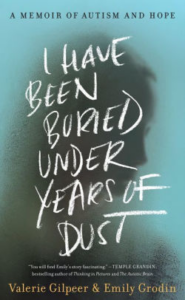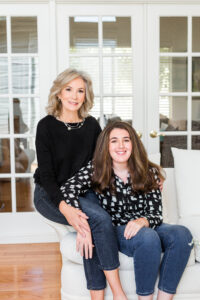Meet Valerie Gilpeer & Emily Grodin, authors, I Have Been Buried Under Years of Dust (A Memoir of Autism and Hope): Interview by Melissa Couch Salim
 I am honored to have been asked to read this book and interview the authors. I congratulate both Valerie and her daughter Emily for their bravery, courage, perseverance and vulnerability in sharing their story!
I am honored to have been asked to read this book and interview the authors. I congratulate both Valerie and her daughter Emily for their bravery, courage, perseverance and vulnerability in sharing their story!
What is your hope in sharing the struggles of autism with others? Well, for those who know little or nothing about autism, we hope to educate as well as open their hearts and minds. Folks need to know there is so much more to those with disabilities than may meet the eyes. There is intelligence, humanity, warmth and kindness. Unfortunately, people tend to dismiss individuals who are different than they are. In doing so, they disregard the unique nature of who may be under the unusual movements and behaviors or the random noises. Emily has reminded people often that she is not “brain dead”, a fact that is true for so many people with autism. Emily’s poems and essays are proof enough of an intelligent and active and alert mind, and a sensitivity which is belied by how she sometimes appears. We hope that our story will give people pause before they categorize and dismiss a person as having nothing to say merely because they are non-verbal.
What insight did you gain about yourself through this challenging journey? Emily taught me patience. She also tested my mettle, made me think in expansive ways and to listen to others. Truly, I learned the virtue of staying the course, believing in my child and myself and ignoring the naysayers who would have had me believe that there was reason to educate Emily as she had not future.
What did you learn about your marriage? Every marriage has its challenges, no matter what is going on with children. I think I came to learn the value of a true partnership- one where I could rely on my husband in all ways. Because we were so committed to Emily- and to each other- we were flexible in adjusting every aspect of our lives to accommodate what she needed. I think we also demonstrated to each other just how unselfish we are. We always thought of each other or Emily before we considered our own personal needs.
And what did you discover about Emily? I was fairly tuned in to Emily from the beginning. I knew how intelligent she was as an infant. There was this huge bright light around her, an awareness ,an engagement and a big personality. When the light dimmed when she was 18 months old I was naturally very concerned, but I never gave up. Now I understand from her that she too was aware of how she slipped away from us. But she demonstrated resilience and a willingness to go along with any therapy we threw her way. I truly believe she wanted to come back to us, and was willing to do the work. Over the years, I have learned just how outcome oriented she is- when she starts a task, she finishes it. In large part, I think her participation in therapy was also part of the same ethic.
What did you learn about others? Family? Friends? Community? That is a more complicated question. I have pretty well addressed my concerns about family and friends in the book. Everyone has their own challenges, so my disappointment in how others failed to assist us in the years was, I guess to be expected. We could have used a lot more help from them, and I challenge all family members to offer assistance to those with a child with a disability. It may sound a bit cliched, but it really does take a village. Who better than family to be that village? As far as the community in general, I think Emily was well known in the immediate community in which we have lived her whole life. I think that as people saw her around town with us, and saw her growth, folks warmed up to her, even those who were not so sure early on .Her personality really did shine through, engaging and sweet, even when she could not use her words effectively.
Looking back, what would you have done differently, if anything, in your decisions towards Emily’s future and education? The choices that we made in educating Emily paralleled our decision to give her the biggest life possible. Initially, at the recommendation of the district “experts” we agreed to place Emily into a special education class, which was with students with like disabilities. I could see that Emily would not be exposed to positive role models in that environment, so we quickly pivoted after about 6 weeks in that class and sought placement in a general education class. This was more consistent with my approach to giving her the biggest life possible ,with exposure to all things that a neurotypical child would have. So, I learned my lesson pretty early on , and from that point, Emily as in general education classes. In my estimation, she benefitted hugely from the modeling of those peers.
Do you believe that all non-verbal autistic children have potential to somehow become verbal through typing, technology etc.? I don’t know for certain. However, I think that so many non verbal children have so much potential which is overlooked. For some, it may due to school district pushback, or families not having access to information which might guide them to services would unleash the potential. But certainly, I have come to believe that any child who is non verbal should be given the opportunity to try alternative means of communication. No one should have any limitations placed on them when it comes to communication.
Did you ever expect what lied deep within Emily? The beautiful words, poetry, thoughts, clarity. I knew a lot was going on with her. I knew that she understood the stories that I read to her, as well as the poetry. Honestly, while her receptive language was intact, I really had absolutely no way of knowing that her words would or could unspool as they have since she began typing.
 What are your continued hopes and dreams for Emily and your family? We hope Emily will continue to write, to pursue her academic path, to increase her circle of friends and live in an environment of her choosing. As the world slowly opens up to more inclusion for those on the spectrum, we hope Emily will be a beneficiary. But I also believe she has the capacity, through her own advocacy, to be part of the vanguard of change. I consider her a strong advocate, both in her words and by example, and think of her as a leader.
What are your continued hopes and dreams for Emily and your family? We hope Emily will continue to write, to pursue her academic path, to increase her circle of friends and live in an environment of her choosing. As the world slowly opens up to more inclusion for those on the spectrum, we hope Emily will be a beneficiary. But I also believe she has the capacity, through her own advocacy, to be part of the vanguard of change. I consider her a strong advocate, both in her words and by example, and think of her as a leader.
How can people get involved to help provide awareness to support the autistic community? The best way would be to participate or volunteer in local activities that support the autism community, help your family and friends who have children with autism, don’t stare at those who have meltdowns in public, but offer help. Don’t pepper parents with questions as to why their child is having a meltdown or demand that they make the child stop, as they have no more control over the meltdown than their child. Our young adults with autism need jobs of substance, not menial work, so encourage them to work in your businesses, create jobs for and employ those with autism. Treat our community with respect and kindness. It will be appreciated.
What do you wish you then that you know now? I think that it might have been helpful to know more about early childhood development. If I had, I might have understood the signs of the disability earlier on. However, as Emily was diagnosed in 1993 at age 2, I am not sure that it would have changed the outcome. I also think that there were additional public services available which I did not take advantage of as I was convinced the disability would simply evaporate by the time she was school aged.
What takeaways do you hope the reader will gain? Most importantly, to try to look beyond the person you “see”. There is so much that lies below the surface in all of us. We tend to believe that if a person does not speak, they have nothing to say. Clearly, that is not the case with Emily or with many other with non verbal autism. I think this is a big takeaway from our book.
What is the best piece of advice you might offer someone parenting a child with autism? I think a parent needs to trust their instincts. If a program offered by a school, or therapist does not seem right to you it probably isn’t. No one knows their child like their parent, and don’t let anyone tell you otherwise. Experts are great, but a parent knows better. When you are in the thick of therapies and sorting out what your child needs, go slowly and don’t be too hard on yourself. If something does not work, re-group and try again. Love your child and encourage them in any way you can.
Tags: parenting a child with autism, raising a child with special needs















